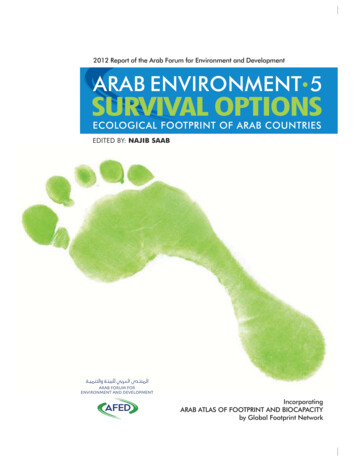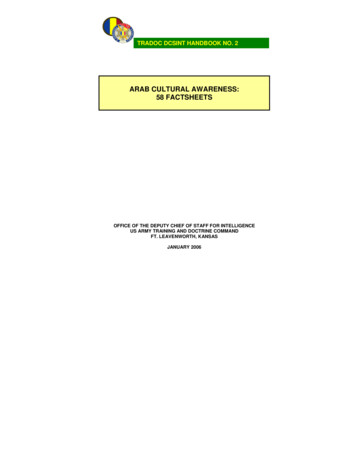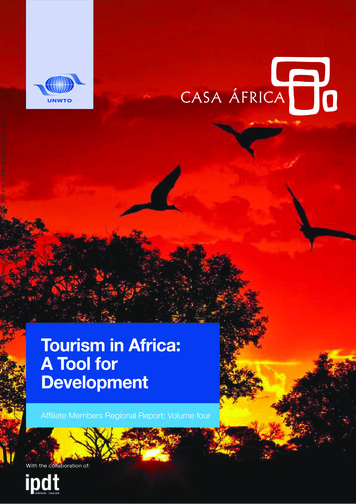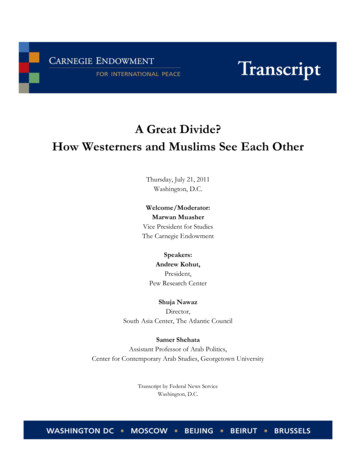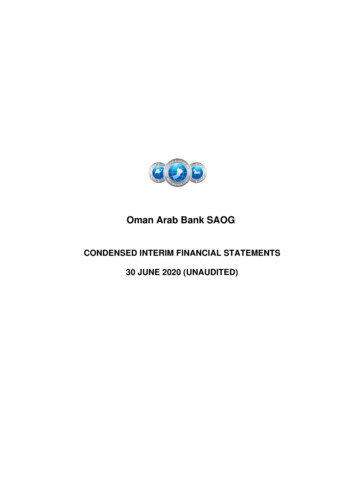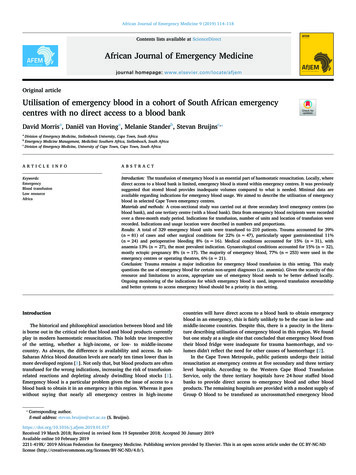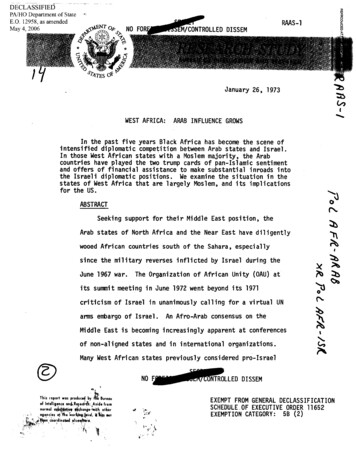
Transcription
January 26, 1973WEST AFRICA: ARAB INFLUENCE GROWSIn the past five years Black Africa has become the scene ofintensified diplomatic competition between Arab states and Israel.In those West African states with a Moslem majority, the Arabcountries have played the two trump cards of pan-Islamic sentimentand offers of financial assistance to make substantial inroads intothe Israeli diplomatic positions. We examine the situation in thestates of West Africa that are largely Moslem, and its implicationsfor the US.ABSTRACTSeeking support for their Middle East position, theArab states of North Africa and the Near East have diligentlywooed African countries south of the Sahara, especiallysince the military reverses inflicted by Israel during theJune 1967 war. The Organization of African Unity (OAU) atits summit meeting in June 1972 went beyond its 1971criticism of Israel in unanimously calling for a virtual UNarms embargo of Israel. An Afro-Arab consensus on theMiddle East is becoming increasingly apparent at conferencesof non-aligned states and in international organizations.Many West African states previously considered pro-Israel
- ii are now wavering. The latest signs of a clear shift to theArab side include Chad's break with Israel last November,those of Niger and Congo in December, and that of Mali inearly January.Israel moved diplomatically into Black Africa immediatelyafter the former colonies became independent. A small-scale,but energetic and effective assistance program won friends inAfrica and votes in the UN. Many of the heavily-Moslem BlackAfrican states enjoyed good relations with Israel.Israel's military victory and continued occupation ofArab territory changed the African perception of the MiddleEast situation. The North African states emphasized theirgeographic ties with the Blacks, and in West Africa playedheavily, where appropriate, on the common religion of Islam.The willingness of some Arab states to provide financialassistance from increasing oil revenues has sped the erosionof the Israeli position. The Arab successes are probablymore the result of isolated initiatives than of a coordinateddiplomatic effort.This development has added another issue on which theUS and African states are often in disagreement. The
- iii trade-off of Arab support for the Black position onminority regimes in southern Africa for African backingon the Middle East has reinforced the voting power ofboth camps. On both issues, the US is believed to havedecisive influence, and both Arab and African countriesseek ways to apply pressure on US policy.[Map of pentetration of Islam in Africa]
I. NATURE OF THE COMPETITIONThe Arab states, especially those of North Africa, have been payingincreasing attention to the Black African countries south of theSahara. The primary aim is to win support for the Arabs' Middle Eastposition, but in some cases pan-Islamic sentiment is also strong.Islam is the religion not only of the peoples of North Africa andSomalia, most Sudanese, and a large minority of Ethiopians, but also ofmost of the inhabitants along the East African coast as far south as theZambezi (see maps). In West Africa Moslems predominate in Mauritania,Senegal, Gambia, Guinea, Mali, and Niger; and they are a large minority inNigeria. Elsewhere in the region,as far south as Zaire, they areincreasing in number and political importance.The theArabextentstates ofhaveIslammade insignificantgains, particularly in recent[Map ofWest Africa]months. Uganda broke diplomatic relations with Israel in March; Chadfollowed in November. Israel announced on December 25 the closing ofits embassies-in Niger and the Congo "for budgetary and administrativereasons," leaving only non-resident accreditation in these two countries.The Congo reacted by severing relations completely, denouncing Israeli
- 2 policies as "imperialist and expansionist." Niger, apparently regrettingthe break, also severed relations completely, The ruling NigerProgressive Party called Israeli representation in Niamey "inappropriate."The number of African countries supporting the Arab position in international gatherings, as noted below, has increased in the last two years.The termination of the north-south armed conflict between Arabs andBlacks in Sudan and the easing of a similar confrontation in Chad mayalso soften the deep-seated suspicions of Blacks, who have neverforgotten the Arab role in the slave trade. The Israelis are disturbedat current trends and apparently are reassessing their position. Inpartial response to their slippage of influence in sub-Saharan Africa,they plan to upgrade their representation in Rwanda to the ambassadoriallevel, and will probably step up activities in Botswana, Lesotho, andSwaziland.More Pro-Arab ResolutionsIncreasing African support for the Arab position on the Middle Eastin international gatherings is evident in the OAU, UN, and periodic nonaligned conferences. As would be expected, the African states that aremembers of the Arab League regularly agree to resolutions condemningIsrael. The non-Arab states that attended the Islamic summit conferenceat Rabat in 1969 and subsequent Islamic meetings at the foreign ministerlevel have tended increasingly in the same direction.The summit meeting of the Organization of African Unity in June 1972went further in support of the Arab position than had previous meetings.Ever since its 1968 summit, the OAU has called for the withdrawal offoreign troops from "all occupied Arab territories" to the line ofJune 5, 1967. The 1969 summit for the first time condemned Israel andThe 1972 heads-of-state assemblyexpressed solidarity with Egypt.unanimously denounced Israeli obstructionism in preventing resumption ofthe UN Jarring Mission, urged all OAU members to give Egypt everyassistance, and called upon UN members to refrain from giving Israel anyarms, military equipment, or moral support.At the UN General Assembly in 1971 more African states than theretofore supported a stronger pro-Arab resolution; 1 and the Arab draftat the 1972 General Assembly, subsequently modified before adoption, wasbased on the text of the 1972 OAU resolution.(1.) Twenty-one African states voted with the Arab states; none withIsrael. The remainder abstained.
-3The Afro-Arab majority at the September 1972 Georgetown (Guyana)Non-Aligned Conference successfully pushed through a declaration callingfor immediate and unconditional Israeli withdrawal from all occupiedlands. The 1973 conference, to be held in Algiers, may go further.Israel First Off the MarkIsrael moved quickly when most African states received independencein the late 1950's and early 1960's. Flattering Israeli telegrams ofrecognition and congratulations often arrived during the first 24 hoursof euphoria after independence. Upper Volta, for example, obtainedindependence on August 5, 1960; the same day, Israeli President Ben-Zvicabled recognition, offered to establish diplomatic relations, andguaranteed 15 scholarships for Voltan students. Israel establishedembassies in all West African countries except Mauritania. Small-scalebut highly appreciated assistance amounting to half of all Israel'sforeign aid followed to 32 African states. A "progressive" Africanleader like Kwame Nkrumah found ties with Israel in keeping with hissocialist, anti-colonial outlook.[Photo of Presidents' Mobutu, Senghor, Gowon,and Ahidjo with Prime Minister Meir]The Israeli image--a small state and energetic people makingstriking progress in a hostile environment--appealed to the newlyindependent African states. African leaders invited to Israel saw a
-4working "socialist" economy and the desert literally made to bloomthrough hard work. Many African leaders who had been active in Frenchpolitics prior to independence--such as Niger's Diori Hamani and Senegal'sLeopold Senghor--retained the sympathetic attitude toward Israel thatwas characteristic of the French political parties to which they hadbelonged. Clearly, technical assistance from the Israelis was worth anoccasional vote on seemingly peripheral UN resolutions.Arabs Enter GameConcerned at these Israeli inroads and looking for support fromother countries on the Middle East question, Arab states began to placemore emphasis on relations with sub-Saharan Africa. Egypt, in theearly 60's, presented Nasserism as an ideology for nation-building, andbegan to take a more active and vocal role in third world affairs. Nonaligned and similar type conferences became a vehicle for Arab influence.To offset visits by African leaders to Israel, Arab states arrangedvisits to their own capitals and offered aid. Algiers and Cairo awardedscholarships to young Africans. The major African liberationmovements opened offices in Cairo, and Algeria provided some of themwith training, money, and arms. In West Africa the Egyptian StateConstruction Company undertook multi-story buildings in Niger, Mali, andIvory Coast. Tunisia provided technical assistance for the establishmentand operation of Niger's development bank. Despite the Arab efforts,the Israeli diplomatic position remained roughly stable until the June 1967war.Israeli Diplomatic Setbacks After 1967The Israeli victory in theSix-Day War had both immediateand longer term implications forthe African view of the MiddleEast situation. Many Africansinitially identified with theimage of an Israeli David lockedin battle with an Arab Goliath.They shared vicarious pleasureat seeing the Arabs humiliatedby the numerical underdog. Butthis identification with Israel'svictory faded as time passed.Israel's policy of aggressive,retaliatory strikes and refusalto withdraw from the occupiedterritories damaged its image.Although nearly all the Moslemmajority states of Black AfricaPresidents Mobutu Sese Sekoand Anwar Sadat
- 5 clearly accepted Israel's right to exist, they became increasinglyreluctant to approve the acquisition of territory (especially "African"territory) by force.The Arab states intensified their diplomatic activity in Africa,particularly in those countries where Islam is strong. They begangiving the Africans more support on the question of white minorityregimes in southern Africa. Egypt, Algeria, Tunisia, Libya, and Moroccostressed, at least to Black Africans, their common continental affinity.They portrayed Israel's continued presence in the Sinai as foreignmilitary occupation of "African" soil.The Qadhafi regime, which came to power in Libya in September 1969,has large sums of money and is willing to spend it in the furtheranceof its foreign policy objectives. It is proving a strong attraction toMoslem Africans. In West Africa, Niger and Mauritania have beenparticular recipients of Libyan aid, and other African leaders must viewthis with at least a hint of envy. After the break in relations withIsrael, Chad's President Francois Tombalbaye visited Tripoli and wasapparently promised credits totalling 92 million. This would be thelargest amount Libya has committed to any Black African country. AlthoughWestern-oriented leaders, such as Niger's President Diori Hamant, may havemisgivings about Libya's adventuresome foreign policy, their need forexternal assistance is critical.Israel attempted to counter Arab efforts but was unwilling to engagein a potentially expensive competition in aid with wealthy oil-producingstates. Foreign Minister Abba Eban was dispatched on a seven-countryfence-mending trip to Africa in June 1971. The purpose of the trip wasclearly to drum up backing in view of the OAU summit meeting scheduledfor Addis Ababa later that month. Israel announced a gift to theAfrican liberation movements at the same time, Although the amount offered, 2,880, was small, South Africa quickly threatened to cut off remittancesfrom Jews in that country to Israel. Near the close of the summit, however, Israel made a preemptive strike in Egypt. Even Israel'sfriends felt obliged to condemn the attack on a fellow OAU member, atleast in public.Saudi Arabia's King Feisal visited Uganda, Chad, Senegal, Mauritania,and Niger November 14-29, 1972. Stressing Islamic solidarity, heoffered a moderate counterweight to the more radical Arab regimes, buthe also sought Black African support for anti-Israeli statements.Communiques issued during the visit condemned both Zionism and apartheid,expressed support for the Palestinian cause, and hinted at possibleSaudi aid to African economic development. It was shortly after thevisit that Chad severed long-standing diplomatic relations with Israel.
- 6 II. THE BOX SCORE IN WEST AFRICAThe improvement in the Arab position and the concomitant weakeningof Israel's has been uneven, but an overall trend is clearlyidentifiable in the country-by-country review below:Mauritania has always considered itself sufficiently Arab topreclude recognition of Israel.Mali had a resident Israeli ambassador until January 5, 1973,although its population is overwhelmingly Moslem. Former MalianPresident Modibo Keita visited Israel prior to Malian independence, andMali has received Israeli technical assistance. Mali has consistentlyvoted with the Arabs on Middle East questions at the United Nations. OnJanuary 5, 1973, the Malian Foreign Ministry summoned the Israeliambassador, informed him that relations were broken with immediateeffect, and issued a communique decrying Israeli air raids on Arabterritory, occupation of Arab lands, and refusal to abide by UN and OAUresolutions on the Middle East.Niger had a residentIsraeli ambassador and receivedmodest amounts of technicalassistance until Israel announcedrecently the downgrading ofrelations to non-residentambassadorial status. Niger hadconsistently abstained on UNvotes critical of Israel until1971. In that year, Libya beganan aid program that made Nigeran "emphasis" country. Exactfigures are not available, butassistance has been on the orderof 4-5 million to date, andhas ranged from cultural andreligious programs to buyingvehicles for the government.[Photo:reasons." ANigerien drummer greets AlgerianPresident Boumedienne during hisMay 28, 1972 visit to Niamey]Events in Niger differedfrom those in Chad, Mali, andCongo. President Diori obviouslyfelt himself under considerablepressure to break with Israel,especially in the wake of theChadian rupture. At this juncture,Israel unilaterally announcedthe downgrading of its embassyto non-resident status, for"budgetary and administrativeApparently as a face-
-7saving gesture, the Niger Progressive Party (which often speaks forDiori when he wants his views publicized without the official presidentialstamp) called Israeli representation in Niger "inappropriate," andcalled for a just and lasting peace which would take account of therights of the Palestinian people and Niger's Egyptian brethren.Nigerapparently did not receive any additional Arab "bonus" for breaking withIsrael, and statements made at the time were comparatively mild. Israelremains mildly optimistic that relations may some day be reestablished.Gambia has a resident Israeli ambassador, and benefits from a smallassistance program. Israeli-Gambian relations have been good, withGambia usually considered solidly in the "pro-Israel" column. However,pressure from other African states has increased to the extent thatGambia feels constrained at least to condemn Israel's occupation ofterritory acquired by force. It voted against Israel in the 26th (1971)General Assembly.Guinea broke relations with Israel following the 1967 war.Senegal is in a delicate position. President Senghor is a Catholicin a heavily Moslem country. Although he has repeatedly noted hisidentification with the Judeo-Christian intellectual tradition and hasleaned toward Israel in the past, Senghor has recently indicated agreater receptivity to Arab advances. His participation in 1971 in theOAU "committee of wise men" to mediate the Middle East dispute left himwith the distinct impression that Israeli intransigence had preventedprogress and that Israel had reneged on promises it had made to him.Senegal's officially stated position on the Middle East used to bebalanced. Continued Israeli occupation of Arab territory and pressurefrom domestic Moslem leaders have changed Senghor's mind. Although bothIsrael and the Arab states are represented in Dakar, Senghor now says,"We are on the side of the Arab people." Israeli setbacks in Niger,Mali, Chad, and the Congo will increase pressure on Senghor to oust theIsraelis from Senegal.[Potho: Presidents Leopold Senghor and Houari Boumedienne]
- 8 Nigeria received Arab support and assistance during its civil war(1967-1970). Egyptian pilots flew Soviet-built aircraft in combat forthe Federal Military Government. Israel, in contrast, provided arms tothe secessionists. The Biafran leader, Lt. Col. C. O. Ojukwu, clearlysaw an analogy between Biafra's struggle and Israel's fight againstnumerically superior Arab nations. Nigeria is cooperating with theArab members of the Organization of Petroleum Exporting Countries (OPEC)to defend their common interests as oil producers. Nonetheless, Arabheavyhandedness can still shock Nigerian sensibilities. In December 1970the Arabs successfully insisted that the Israeli ambassador be expelledfrom the diplomatic gallery at an open session of the OAU being held inLagos. Even normally pro-Arab newspapers criticized this breach ofcourtesy.Chad maintained relations with Israel from shortly afterindependence until November 28, 1972. Libyan differences with Chad ledto a reconciliation meeting in Niamey, Niger, in April 1972. The meeting'sfinal communique, which restored diplomatic relations between the two,also associated Chad with "the just, armed fight of the Palestinianpeople for the liberation of their territory occupied by Israel." SaudiArabian King Feisal's visit to Chad November 17-20 undoubtedly addedimpetus to the movement that culminated in the severance of relations.Chad's President, Francois Tombalbaye, visited Tripoli in late December,returning with the promise of a 92 million loan.Upper Volta, one of the poorest countries, bases much of its foreignpolicy on the need for assistance. Israeli aid to date includes anumber of scholarships for study in Israel, a pediatrician, and anadviser to the national lottery. Although President Sangoule Lamizanaupholds Israel's right to exist, he stated in March 1972. "There will beno peace as long as people occupy territory which does not belong tothem." Lamizana sent his Foreign Minister to Jerusalem to balance hisown visits to Libya and Egypt in February and March. Arab aid toUpper Volta has included scholarships for agricultural studies in Egypt,and subsidies from Egypt, Algeria, and Libya to the Voltan Moslem community.For the moment, Upper Volta remains in the "neutral" column, but ifLibyan, or possibly Kuwaiti or Saudi, money becomes available, thetemptation to move further from Israel will grow.Ivory Coast remains Israel's strongest ally in West Africa.Assistance from Israel, amounting to several hundred thousand dollars ayear, has run the gamut from Para -military to help in agriculture andmechanized farming. Private Israeli investment, particularly in thehotel business, amounts to some 14 million. Ivorian Middle East policyis unlikely to shift during President Nouphouet-Boigny's lifetime. Nonetheless, Algeria, Tunisia, Lebanon, and Egypt maintain embassies inAbidjan. The El Nasr Company, Egypt's state trading concern, has officesin Ivory Coast.
--9-III. IMPLICATIONS FOR THE USThe increasing alignment of African countries on the Arab side ofthe Middle East dispute interjects another issue on which Africans andthe US do not agree. The more activist Arab governments are happy touse the voting power of numerous sub-Saharan states to reinforce theirposition. In return, these countries welcome Arab support on such issuesas southern African liberation. Each group believes the US has thepower to force the changes they themselves desire, be it in the MiddleEast or in southern Africa. Increasing Arab influence in Black Africaspeeds the development of conscious efforts to find ways to bringpressure on the US in areas of prime concern to Arabs and Africans.
Sahara. The primary aim is to win support for the Arabs' Middle East position, but in some cases pan-Islamic sentiment is also strong. Islam is the religion not only of the peoples of North Africa and Somalia, most Sudanese, and a large minority of Ethiopians, but also of most of the inhabitants along the East African coast as far south as the
